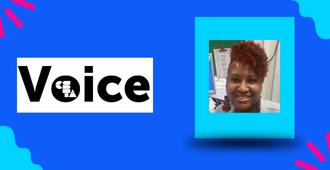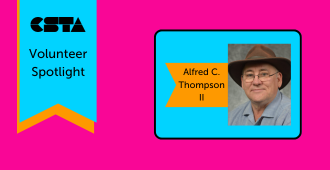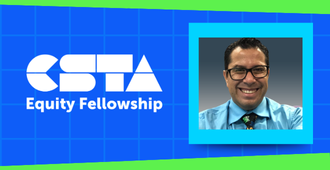Ebonie Campbell has taught computer science at Maury High School in Norfolk, VA, for the last decade. She is currently involved in a grant project with CodeVA, in which she serves as a research-practice partner for computer science career-technical education. The grant project aims to support high school CS teachers to acquire computer science endorsements as they learn to teach more advanced computer science concepts. It targets teachers like Ebonie who currently provide introductory CS instruction to underserved student populations in the state of Virginia. Ebonie holds a bachelor’s degree in computer science and a master’s degree in education. She lives in Virginia Beach with her husband and twin teenage daughters.
At Ebonie’s majority-Black school, her introductory computer science classes include a lot of Black students, but many of those students fall away when it comes to taking higher-level classes like AP Computer Science. One huge reason for this is the digital divide among Black students, who are less likely than their white counterparts to have a home computer and reliable home internet access. Without that access, they are shut out of advanced computer science learning, because AP CSP uses many web-based programs like Code.org, CodeHS, and Albert.io.
Although this problem remains unsolved, Ebonie pursues many other avenues to ensure that her Black students get the chance for concrete, hands-on CS learning opportunities—and that they keep pursuing their CS learning. Her introductory CS class, IT Fundamentals, teaches very basic JavaScript, and she concludes the class with a project where students create a Java-based video game. This gives students a taste of what to expect in the AP class, and Ebonie tells those students that if they continue on to the AP course, they’ll be able to keep on creating more advanced games and apps. This strategy has helped Ebonie increase enrollment of Black and female students in her AP CS Principles class and create a pipeline from introductory to more advanced computer science.
Getting kids into careers in tech requires building and maintaining a solid pipeline of CS education, and that’s another problem Ebonie has tried to tackle in her career. Since 2015, she has worked and trained with CodeVA, a company committed to bringing computer science education to every teacher and student in the state. Her current grant partnership, CS for CTE, designs and implements professional development for Virginia teachers looking to learn advanced CS skills and concepts and earn a computer science endorsement. Through this partnership, says Ebonie, “I have been trained to effectively teach computer science to students in a predominantly African American school and have been given the necessary resources to do so.”
Heading into her time as a CSTA Equity Fellow, Ebonie hopes to learn more about opportunities for students to gain work experience in computer science, whether through industry certifications, internships, or work-based projects. She wants to keep building the pipeline for underrepresented students in her school, and she hopes to learn from her cohort about strategies for recruiting girls into computer science, such as establishing a Girls Who Code club.
Right now, Ebonie is one of two computer science teachers at her school. In the company of her cohort, she is eager to create new learning projects and career partnerships for her students, find ways to support her colleagues in incorporating CS in their classrooms, and identify strategies to get her students the equipment they need to succeed in computer science.





